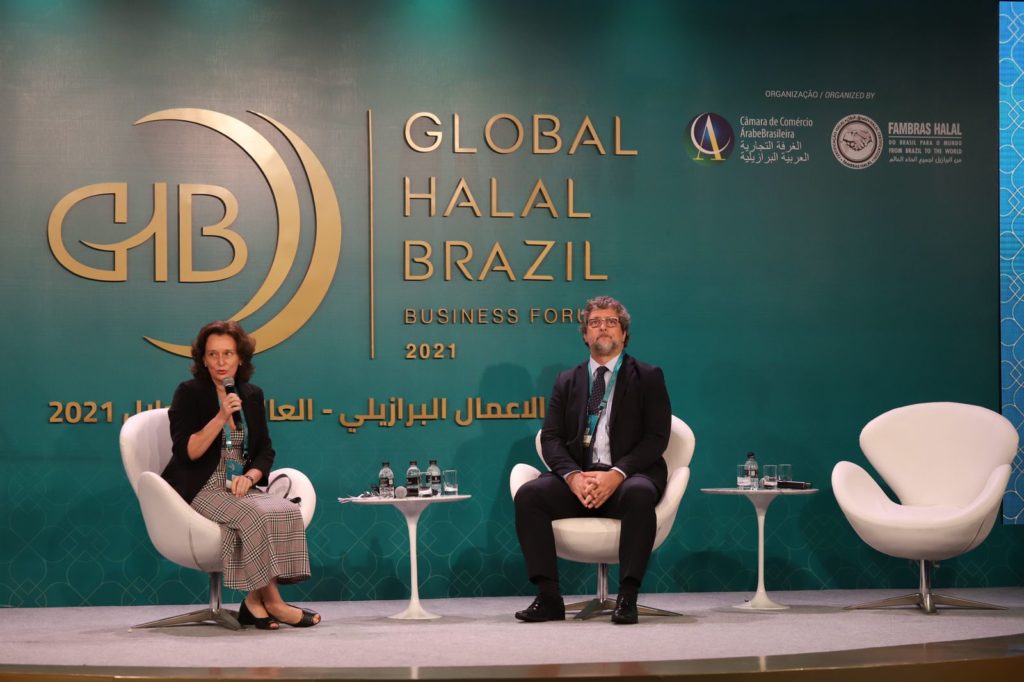São Paulo – Brazilian halal food is safe and sustainable. The phrase was said by more than one guest of the panel ‘Brazil – Sustainability and technology in the food sector’ on the first day of the Global Halal Brazil (GHB) business forum. The forum runs until Wednesday (8) and is organized by the Arab Brazilian Chamber of Commerce (ABCC) and the Federation of Muslim Associations of Brazil (FAMBRAS Halal).
The president of CropLife Brasil, Christian Lohbauer, said Brazilian food is safe, has quality throughout its production chain since the beginning of production, its control institutions are serious, and there is absolute control. “Brazilian halal certification is absolutely safe and has to be honored like so,” he declared. Croplife Brasil is the union of five Brazilian associations in the biotechnology sector.
“Brazilian food is safe, sustainable, and of the highest quality,” added Camila Sande, coordinator of Trade Promotion at the Brazilian Confederation of Agriculture and Livestock (CNA). Sande informed the entity represents approximately two million rural producers in Brazil. For her, it is necessary to work on the diversification of the exports basket, focusing on foods with higher added value and inserting small and medium-sized rural entrepreneurs in foreign trade. “We are talking about dairy products, honey and its derivatives, specialty coffees, fruits and processed fruit products, and fish,” said Sande.
For the coordinator, the most significant technical challenge for sustainable models in food production is making these technologies reach producers, training, qualifying, and engaging them. CNA offers the National Rural Learning Service (SENAR), which trains producers on their properties, from technical and managerial assistance to precision agriculture with the most sophisticated technologies,” she said.
She also said there are lines of rural credit within the LCA (Low Carbon Agriculture) program rural producers can use to adapt their properties.
The region that matters
Representing the Arab countries, the deputy director-general and regional representative for the Near East and North Africa of the Food and Agriculture Organization (FAO) of the United Nations (UN), Abdulhakim Rajab Elwaer, said the Islamic market has 1.3 billion consumers in the world who follow religious, economic, and political precepts and want food suitable not only for halal but also in economic, financial aspects and from the suitable sources.
“We live in a region where over 60% of food is imported. We are talking about more than USD 2.3 trillion, and this market is expected to grow 20% annually,” said Elwaer. He informed the Gulf Cooperation Council (GCC) countries import over USD 50 billion in halal products per year, and solely the United Arab Emirates, more than USD 1 billion annually.
Elwaer highlighted the importance of technology and sustainability in the production chain, mentioning traceability, blockchain, and digitalization as critical elements for this product flow.
The director-general recalled the climate issue is increasingly important in the Middle East and North Africa (MENA) region, and it is heavily affected by dry land and water shortages. “The most important thing is trust and credibility. The more the technology is implemented to guarantee this, including traceability, the more this product or company will be respected,” he said.
He also said halal should not only be aimed at the Islamic community but access to halal food and cosmetics, for example, should be expanded to other markets through south-south cooperation to encourage trade between the countries.
The panel was moderated by Silvia Helena Galvão de Miranda, head of the Department of Economics, Administration, and Sociology of the Luiz Queiroz School of Agriculture of the University of São Paulo (ESALQ-USP).
The forum is sponsored by the Brazilian Trade and Investment Promotion Agency (Apex-Brasil), BRF, Pantanal Trading, Portonave, and Iceport.
Follow the complete forum coverage:
Read more about the GHB:
- Islamic market returning to pre-pandemic levels in 2021
- Brazil’s Temer: “Halal could go beyond Islamic market”
- Brazil must promote image to diversity exports
- Islamic economics education was impacted by COVID-19
- Apex-Brazil wants to take halal to small enterprises
- Ready-to-eat foods are trend in halal
- Post-pandemic world to invest in public healthcare
Translated by Elúsio Brasileiro




